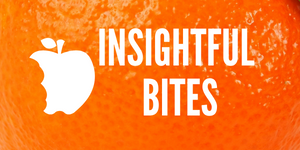Issue 9 of Insightful Bites is here, to get your teeth into!
Each month, the Sharp Relations team saves you time and research by putting together a round-up of all the latest trends and insights we see from working in the world of food and drink all the time.
This month we’re shining a light on plant based by bringing you all the latest insights from Bread & Jam’s brilliant Plant Based Summit. It took place on Friday 14th October and brought together:
- 300 people, an amazing powerhouse of entrepreneurs behind some of today’s most dynamic plant-based challenger brands,
- more than 220 brands
- a stellar line-up of 28 speakers and panellists sharing their insights.
Our very own AJ Sharp also chaired a panel of guests from Oatly, Ecotone and Richmond, discussing mainstream marketing and how to make your plant-based brand appeal to a wider audience.
Says AJ: “I loved chairing this innovative panel of experts. Oatly’s Ishen Paran’s advice, if budgets are tight, was to make sure you engage the full marketing mix but focus on a smaller demographic to make your budget go further. Oatly focused their budget on coffee shops initially and that’s how they achieved the meteoric market awareness we all saw. Total respect for Ishen Paran from Oatly, who handled some challenging questions from the floor with total aplomb.
“Klaus Arntz from Ecotone (the mission driven company championing nature-kind farming) had some very interesting thoughts about really engaging and understanding your audience, really getting inside their mind, and understanding who and what they need, what matters to them.
“Sioned Hook from Pilgrim’s Food Masters/ Richmond Sausages had another interesting perspective as she’s coming from mainstream and launching into plant based. She said the most effective activation for them was investing in Veganuary activities. They put all their budget into that and got great return on investment.”
Rationalisation in the Meat Free Category
Sara Reid from Kantar shared some brilliant insights into the current state of the plant based category and how the cost-of-living crisis is impacting consumer shopper behaviour:
- Since April there has been an increase in the number of struggling households in GB with 42% managing and 24 % struggling
- Consumer behaviours can be summarised:
- The non-essential market – e.g. fashion, cinema going – this spend is reducing
- 75% of consumers will absorb the price increases
- 80% of categories are trading into private label – 50% of categories have been trading up
- Struggling households are cooking more from scratch – they are also skipping meals – breakfast being the most prevalent
- Families are also considering more economic ways of cooking, there has been a huge interest in air fryers this year, as they are more economical.
- We’re seeing the impact of inflation hitting categories differently so unlike other recessions no category is bomb proof
- In Total Grocery the Comfortable are cutting back – how does this look for your category?
- Value is subjective – don’t assume that bigger packs mean better value for struggling shoppers
- We’re partying like it’s 2019 – OOH visits are back to that level – FOR NOW!
- Growth in the meat free market is slowing with only a 0.2% YOY increase compared to 14.8% YOY in 2021.
- Growth in dairy free market is slowing too but not quite so dramatically with a 4.8% YOY increase compared with a 15.3% YOY in 2021
- Brand is still king but there is more competition vs private label in Meat Free. Brands really need to show how they add value and their worth.
- Fresh is outstripping Frozen in terms of growth but we know from Covid that Frozen becomes more important when consumers are managing tighter budgets.
- Empty Nesters are amongst those that are the most engaged with Meat Free, holding a larger proportion of spend than they do in total grocery – don’t forget about them in your marketing. They are upping their plant-based consumption driven by health motivations.
- Eco-actives – those who care most about sustainability – have declined by 3% and are back to 2019 levels but still worth £29bn to FMCG. Even eco considerers are down 3% (people who will make a more environmental choice if it’s easy and there’s not too much compromise) and eco dismissers up 7% which is alarming news.
- To gain new consumers and grow the category plant-based brands need to go beyond Flexitarians who currently sit at around 13.8% of the market and target the ‘Vores who represent 75% of consumers.
What did Quorn have to say?
Marco Bertacca, CEO of Quorn, a founding brand of the plant-based category since the 1950s, showcased the brand’s journey from the conception of mycoprotein to first product launch in 1985 to what’s next. Here are some highlights from his talk:
- The meat free category is rationalising as me-too products get edged out in favour of products that really offer a point of difference and deliver on TASTE!
- Consumer behaviour is changing and now the market is becoming more attainable, appealing to mass market consumers with leading brands like McDonald’s and Greggs developing great tasting vegan options and making the category accessible to meat eaters.
- Brands need to think about where they put their products, don’t try to be everywhere and work with selected retailers that match your demographic. Monitor rate of sales and be realistic about what is working.
- The key to success is collaboration, plant-based brands must work together.
The best of the rest…
- Premiumisation of frozen is going to be key as is better communications on the benefits of fresh frozen produce such as nutrition, convenience, and shelf-life.
- How siting of meat free in the meat fixture could be much more disruptive and help the category reach new consumers.
- How the category needs to carefully consider different demographics, old v young and use relevant messaging to appeal to different segments e.g. health for older consumers v environment for younger consumers.
- How there is a big opportunity for world flavours and different cuisines as people seek out new flavours and variety.
- Darren O’Sullivan from Kerry talked about the importance of texture and succulence and how Kerry is using cultured fats to improve this.
- The importance of seasonal flavours and taking inspiration from mainstream e.g. the BBQ opportunity.
- Claire Hughes from Sainsbury’s highlighted the importance of the story behind the brand.
- Colour choice of product branding is key for on-shelf stand-out.
- Consistency is also crucial.
Finally, the day was wrapped up with a brilliant peek behind the scenes into Sharp client Biff’s incredible success story: charting their journey from street food supremo to multiple retailer listings and several major food service customers.
If there was one message that came through loud and clear at Plant Based Summit, everyone agreed that to be successful, a product must deliver on TASTE, with nutrition a close second. If it doesn’t taste good, then people just aren’t going to come back.
All the latest team news from Sharp HQ here.





